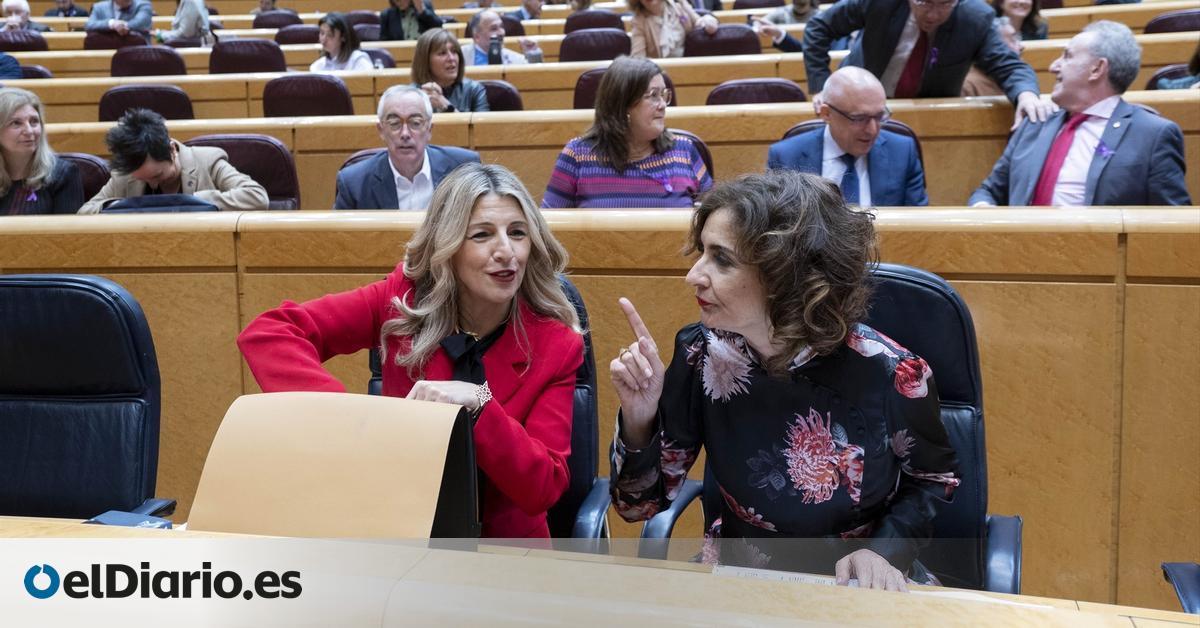
“The vocation of this Government was the presentation of the General Budgets [PGE de 2024], but obviously politics is not about fabricating headlines that rely on fake news. It consists of improving the general interest. And in knowing how to read reality,” the first vice president, María Jesús Montero, answered this Wednesday in the Government control session in Congress, to a question from the parliamentary group of the Popular Party (PP). “The calling of elections in Catalonia alters the political table. The moment of approval of the Budgets is being delayed […]. And we are going to present the 2025 Budgets soon, which I hope you are willing to agree to,” he continued.
“I prefer extended accounts [las de 2023] than the budgets of the Popular Party: cuts, cuts, cuts…”, added the also Minister of Finance. Surely his Executive partners do not want accounts designed by the PP either, but the truth is that, in recent days, different voices from Sumar’s political space have shown their discomfort with the decision of the economic ministers of the PSOE and President Pedro Sánchez to give up negotiating the General State Budgets (PGE) for 2024.
“The same afternoon [del 13 de marzo] “that Pedro Sánchez unilaterally announced that the Budgets would no longer be worked on until 2025, we were negotiating,” sources from the Ministry of Labor and Economy of the second vice president, Yolanda Díaz, lament to elDiario.es. Along the same lines, this Wednesday, Sumar’s parliamentary spokesperson, Íñigo Errejón, warned that “it is irresponsible to lower one’s arms at a time of much citizen fatigue with politics, at a time of a kind of moral decline in trust.” between citizens and their representatives, of great difficulty for many families, and even of geopolitical instability.”
The main reason for the clash between Sumar and the PSOE is that without Budgets it will be more difficult and “slow, fighting more private battles”, to approve some of the most important agreements of the coalition Government and that could have been included in the Law itself. of Budgets. What has been seen as impossible to approve in one fell swoop due to the entry into the electoral campaign of the investiture partners, both from Catalonia in May –Junts and ERC–, and from Euskadi in April –PNV and EH Bildu–, will now have to be negotiated. part by part.
From the Treasury and from the Ministry of Economy of Carlos Body, they continue to insist that, “in practical terms, the space generated by the extension of the PGE 2023 is sufficient to continue advancing with the political priorities for this year 2024, and now concentrate the effort in the Budgets for the year 2025.” This extension and the Royal Decree-Laws at the end of the year guaranteed the revaluation of pensions, 9,000 million investments from the European funds of the Recovery Plan or measures such as discounts on public transport and the reduction of VAT on food. But other issues have remained up in the air.
From the Ministry of Labor they emphasize “that abandoning the Budget negotiation is not good news. Even so, and already assuming this, we are studying all avenues because the people cannot be the ones who ultimately lose from the PSOE’s decision.”
Taxes on banks and energy companies
One of those agreements of the coalition government that could have been addressed in the law on the general accounts of the State is the conversion of temporary taxes on banking and energy companies, which in the last year have collected close to 3,000 million euros. in permanent taxes. “We maintain our intention to modify them as we announced. We are looking for a way to carry it out, which did not have to be solely through the PGE,” say sources from the Ministry of Finance of María Jesús Montero.
“The permanence of the taxes on banking and energy companies is included in point 8 of the Government agreement. The Decree-Law by which they were approved established their validity for 2023 and 2024 and that in the last quarter of this year 2024 a study will be carried out to evaluate their permanent maintenance, therefore they did not depend on the 2024 budgets. Given the historical benefits that large companies in these oligopolistic sectors have had in recent years, at Sumar we do not contemplate any other scenario other than their maintenance indefinitely in compliance with the pact when this review is carried out at the end of the year,” they explain from the Diaz team.
Precisely, the Royal Decree-Law of the end of 2023 with the partial renewal of the anti-crisis measures introduced the authorization so that the PGE could rebate the tax on energy companies, “but we oppose this rebate and our approach is that they remain in its entirety, since these two sectors have an oligopolistic structure that brings them extraordinary benefits and that allows them to lend a hand to a greater extent,” they continue from Trabajo.
Another of the “battles” that Sumar has assumed to be vital is the reduction of the official working day without a reduction in salary. “That is, we are going to free up time for workers, we are going to expand the freedom of everyone, not just that of those who can pay for it. The Ministry of Labor, the Government, will do that, and then it will come to the Congress of Deputies and will have to be approved. We would have liked it with Budgets, but without them it is also possible and we are going to do it,” Íñigo Errejón stated this Wednesday.
Measures to be approved via Royal Decree Law
Other measures that depended on the General Budgets, such as the increase in the salaries of civil servants, the adjustment of the IRPF of the Minimum Interprofessional Salary (SMI) or the increase in the reference index for public aid (the IPREM), are pending the approval of new Royal Decree-Laws by the Council of Ministers or amendments to others that have not yet been validated.
An amendment to the Decree-Law with the anti-crisis measures that still has to be voted on in Congress will be entrusted with the improvement of 2% of the salaries of public workers, as agreed for 2024. This “path” will make the increase reach at least four months late.
Regarding the IPREM, elDiario.es has learned that in the conversations on the Budget Law there was no agreement between the PSOE and Sumar. Now it’s completely up in the air. Its freezing removes it from the SMI and that means that there is a risk that some vulnerable families that have benefited from the increase in the minimum wage will lose their right to benefits or aid.
“In addition, within the framework of the budget negotiation we were proposing increasing the taxation of capital income to bring it closer to that of work and increasing the taxation of large fortunes with the objective that they contribute to financing the increase in spending. social and investments to modernize our productive fabric,” they add from Trabajo.
The same position is defended by the Ministry of Social Rights, Consumption and Agenda 2030. “The decision to renounce the General Budgets of 2024 has been taken by the PSOE, so for this Ministry it is an unexpected situation,” they say from the portfolio. by Pablo Bustinduy. “The formulas will be studied to move forward with the matters that are the responsibility of this Ministry (for example, the improvement of paternity and care leave in the Family Law),” they continue.
Source: www.eldiario.es

